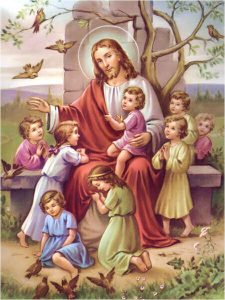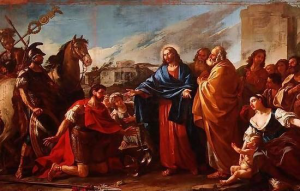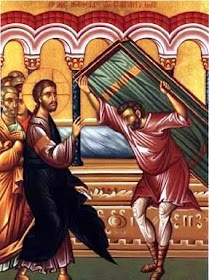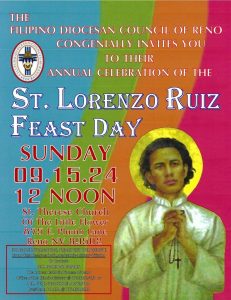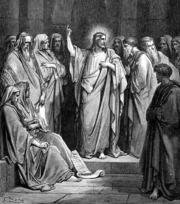Today is the 27th Sunday in Ordinary Time, Year B. We enter into the month of October, the month of the Holy Rosary. As a family that belongs to a parish faith-community, it is fitting to find time to recite the rosary together. The famous rosary crusader, the late Fr. Patrick Peyton, says, “The family that prays together stays together.” We are encouraged to pray the most effective weapon against the infestation of Satan and for the conversion of sinners. There is that inner peace in praying together.
The readings today remind us of our fidelity and faithfulness to God. It is in the context of our response towards Jesus’ invitation to discipleship, which is detachment from all worldly and self-conceited behaviors that impede God’s grace to grow in our desire for eternal salvation.
The first reading from the book of Genesis tells us about God’s intention, to create particularly human beings and to put everything in a harmonious existence and order. God knows how to satisfy the human desire by giving a man a suitable partner. After creating living things, especially His master creation, the human person, God saw everything good! The Lord God said, “It is not good for the man to be alone,” so He fashioned “woman” so they would cling to each other. This distinct relationship between man and woman is to give the real meaning of love within the framework of God’s love. Human love relationship is not a replacement for that continuous loving relationship toward God. However, God’s love desires us to experience finite love. Mindful of that infinite love God has for us, this first reading is the story of the necessity for order in relationships because God works very well in working things out perfectly.
The second reading, taken from the letter to the Hebrews, is a confession of the early Christians that Christ died for us and our sins. Christ, being the High Priest, willingly offered himself, a perfect sacrifice on our behalf to the Father. It has a clear message that Jesus Christ experienced death for us all, because He leads us to the path of salvation and among us, He is our Brother. Christ is the perfect One for fulfilling the task of bringing us into a new relationship with God.
The gospel taken from St. Mark narrates to us about a Pharisee questioning Jesus about marriage, divorce and the Law. Jesus’ meaningful response affirms, not only marriage, but orderliness which human love is meant to create according to His own purpose. Let us open our hearts and minds to have a deeper understanding:
First, the creation of a woman from the rib of a man, which we hear from the Book of Genesis, is God being aware that the man is incomplete; thus, God says, “It is not good for the man to be alone.” God offers the man various animals to accompany him, but they failed. Our pets cannot substitute that inner desire to make our human desire totally complete. There is no substitute for human love. Therefore, when he experiences the woman, he feels a union with her which begins the sacramental touch and divine will for man and woman to be together. There are no other genders, except man and woman, to make the sacramental marriage possible.
Second, Jesus is confronted by the Pharisees, whom the evangelist Mark uses to outwit them, so that Jesus’ teaching might be clearer and to the point. They asked Jesus whether or not He allows divorce. They know that Moses did allow it because of their hardness of hearts, Moses wrote the bill of divorce. Then Jesus forces them back to a more ancient teaching in Genesis that “God made them male and female. For this reason, a man shall leave his father and mother and be joined to his wife and the two shall become one flesh. Therefore, what God has joined together, no human being must separate.” This beautiful admonition from the very beginning of creation must be obeyed for we cannot despise the very intent of God, our Creator.
Third, the people were bringing children to Jesus, but His disciples rebuked them. Jesus says, “Let the little children come to me, do not prevent them, for the kingdom of God belongs to such as this.” This is the turning point on the part of Jesus to explain to the disciples about the right way to have an all-embracing attitude and love for all in the Kingdom of God.
Jesus has an encompassing love and mercy for everyone, inclusive of age, race, and gender because we are all little children of God. Jesus makes us aware that through the readings we heard, we commit ourselves to His teaching of marital fidelity, sacredness of marriage and commitment to chastity. I believe that Jesus’ teaching intrudes on seeking our human freedom to do whatever seems good, feels good and sounds good as long as it is with the moral standard set by our Lord. Our human desire to love and be loved is as sacred as sexual expression of love is and as sacred as our desire for commitment is and cannot be an avenue resulting in disorder and desecration.
Jesus Christ is our ever living and present Brother! He is God and Savior of all people, the good and the bad, the divorced, gay, lesbian, straight and transgender. It means all inclusive; it means everyone. Jesus’ clear prohibition of same sex union and cohabitation and prohibition of divorce can be a source of suffering for those who experience difficulties, in particular in their married lives. But St. Paul suggests that we have to accept pain the way Jesus did, as the suffering we should endure on the way to glory. The Kingdom of God is the divine embrace of what is perfectly good for all according to His divine will if we accept the challenge of living the teaching of Jesus with the trust of the little children. Maybe this is what Jesus meant when He said that “whoever does not accept the kingdom of God like a child will not enter it.”
God bless you.
Fr. Arlon, osa
El dictado del corazón
Vigesimoséptimo domingo del Tiempo Ordinario, Año B
- Génesis 2:18-24
- Salmo 128:1-2, 3, 4-5, 6
- Hebreos 2:9-11
- Marcos 10:2-16 o 10:2-12
Hoy es el Vigesimoséptimo Domingo del Tiempo Ordinario, Año B.
Entramos a Octubre, el mes del Santo Rosario. Como familia de una comunidad de fe parroquial, es apropiado encontrar tiempo para rezar el rosario juntos. El difunto padre Patrick Peytondijo: “La familia que reza unida permanece unida”. Se nos anima a rezar el arma más eficaz contra la infestación de Satanás y por la conversión de los pecadores. Existe esa pazinterior al rezar juntos.Las lecturas de hoy nos recuerdan nuestra fidelidad y lealtad a Dios. Es en el contexto de nuestra respuesta a la invitación de Jesús al discipulado, que es el desapego de todos los comportamientos mundanos y egoístas que impiden que la gracia de Dios crezca en nuestro deseo de la salvación eterna.
La primera lectura del libro del Génesis nos habla de la intención de Dios de crear a los seres humanos y poner todo en armonía y orden. Dios sabe cómo satisfacer el deseo humano dándole al hombre una pareja adecuada. Después de crear los seres vivos, especialmente a su maestro de la creación, la persona humana, Dios vio que todo era bueno. El Señor Dios dijo: “No es bueno que el hombre esté solo”, así que formó a la “mujer” para que se aferraran el uno al otro. Esta relación distinta entre el hombre y la mujer es para dar el verdadero significado del amor en el marco del amor de Dios. La relación de amor humano no es un reemplazo de esa relación amorosaque continua hacia Dios. Sin embargo, el amor de Dios desea que experimentemos un amor finito. Conscientes de ese amor infinito que Dios tiene por nosotros, esta primera lectura es la historia de la necesidad de orden en las relaciones porque Dios trabaja muy bien y hace que las cosas salgan perfectamente.
La segunda lectura tomada de la carta a los Hebreos es una confesión de los primeros cristianos, de que Cristo murió por nosotros y por nuestros pecados. Cristo, siendo el Sumo Sacerdote, se ofreció voluntariamente, a un sacrificio perfecto en nuestro nombre al Padre. Tiene un mensaje claro de que Jesucristo experimentó la muerte por todos nosotros, porque nos conduce al camino de la salvación, Él es nuestro Hermano. Cristo es Perfecto para cumplir la tarea de llevarnos a una nueva relación con Dios.
El evangelio tomado de San Marcos nos narra acerca de un fariseo que le pregunta a Jesús sobre el matrimonio, el divorcio y la Ley. La respuesta significativa de Jesús afirma no solo el matrimonio sino el orden que el amor humano debe crear según Su propio propósito. Abramos nuestros corazones y mentes para tener una comprensión más profunda:
Primero, la creación de una mujer a partir de la costilla de un hombre, escuchamos del Libro del Génesis que Dios es consciente de que el hombre está incompleto, por lo tanto, Dios dice: “no es bueno que el hombre esté solo. Dios le ofrece al hombre varios animales para que lo acompañen, pero fallaron. Nuestras mascotas no pueden sustituir ese deseo interior para que nuestro deseo humano se cumpla totalmente. No hay sustituto para el amor humano. Por lo tanto, cuando experimenta a la mujer, siente una unión con ella que inicia el toque sacramental y la voluntad divina de que el hombre y la mujer estén juntos. No hay otros géneros, excepto el hombre y la mujer, para hacer posible el matrimonio sacramental.
En segundo lugar, Jesús se enfrenta a los fariseos, a quienes el evangelista Marcos utiliza para burlarlos de modo que la enseñanza de Jesús sea más clara y concisa. Le preguntaron a Jesús si permitía o no el divorcio. Sabían que Moisés lo permitió debido a la dureza de sus corazones, Moisés escribió la carta de divorcio. Entonces Jesús los obliga a volver a una enseñanza más antigua en Génesis: “Dios los hizo varón y hembra. Por eso el hombre dejará a su padre y a su madre, y se unirá a su mujer, y los dos serán una sola carne. Por tanto, lo que Dios ha unido, ningún ser humano lo separe”. Debemos obedecer esta hermosa advertencia desde el principio mismo de la creación, porque no podemos despreciar la intención misma de Dios, nuestro creador.
En tercer lugar, la gente llevaba niños a Jesús, pero sus discípulos los reprendieron. Jesús dice: “Dejad que los niños vengan a mí, no se lo impidan, porque de los que son como éstos es el reino de Dios”. Este es el punto de inflexión por parte de Jesús para explicar a los discípulos cuál es la manera correcta de tener una actitud y un amor que abarquen a todos en el Reino de Dios.
Jesús tiene un amor y una misericordia que abarcan a todos, incluyendo a personas de edad, raza y género, porque todos somos pequeños hijos de Dios. Jesús nos hace conscientes de que a través de las lecturas que escuchamos, nos comprometemos con su enseñanza de fidelidad marital, sacramental del matrimonio y compromiso con la castidad. Creo que la enseñanza de Jesús se entorna en la búsqueda de nuestra libertad humana para hacer lo que parezca bueno, se sienta bien y suene bien, siempre y cuando sea con el estándar moral establecido por nuestro Señor. Nuestro deseo humano de amar y ser amados es tan sagrado como lo es la expresión sexual del amor y tan sagrado como lo es nuestro deseo de compromiso y no puede ser una vía que resulte en desorden y profanación.
¡Jesucristo es nuestro Hermano siempre vivo y presente! Él es Dios y Salvador de todas las personas, de los buenos y los malos, de los divorciados, gay, lesbianas, heterosexuales y transexuales, es decir, de todos, de todos. La clara prohibición de Jesús de la unión y la cohabitación entre personas del mismo sexo, la prohibición del divorcio puede ser una fuente de sufrimiento para quienes atraviesan dificultades, en particular en sus vidas matrimoniales. Pero San Pablo sugiere que tenemos que aceptar el dolor como lo hizo Jesús, como el sufrimiento que debemos soportar en el camino hacia la gloria. El Reino de Dios es el abrazo divino de lo que es perfectamente bueno para todos según Su voluntad divina si aceptamos el desafío de vivir la enseñanza de Jesús con la confianza de los niños pequeños. Tal vez esto es lo que Jesús quiso decir cuando dijo que “quien no acepte el reino de Dios como un niño, no entrará en él”.
Dios los bendiga.
Padre Arlon, osa
